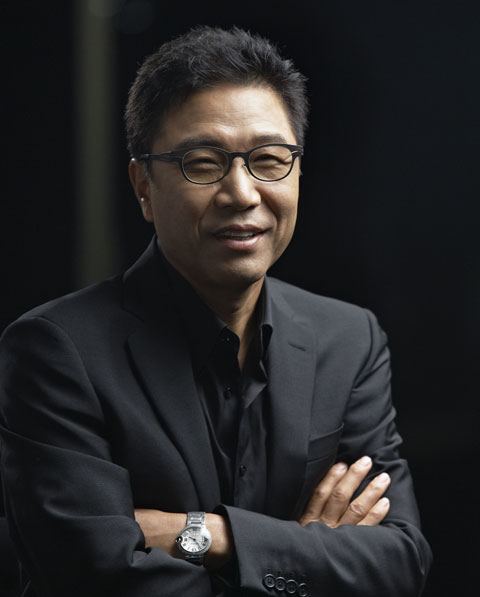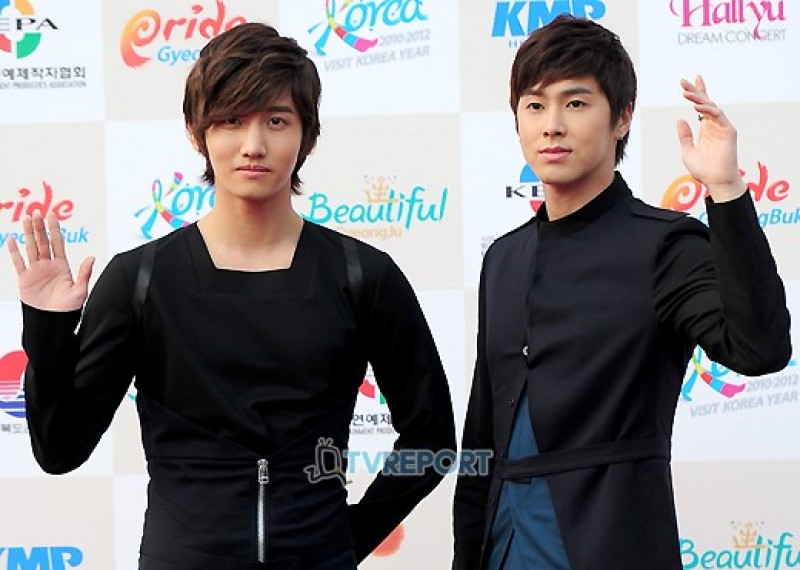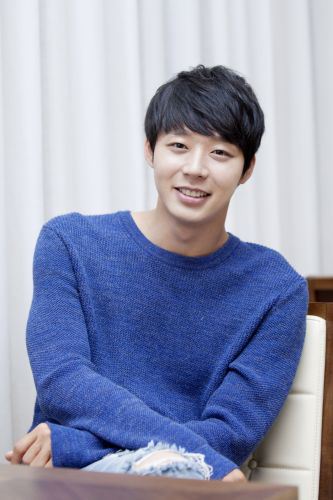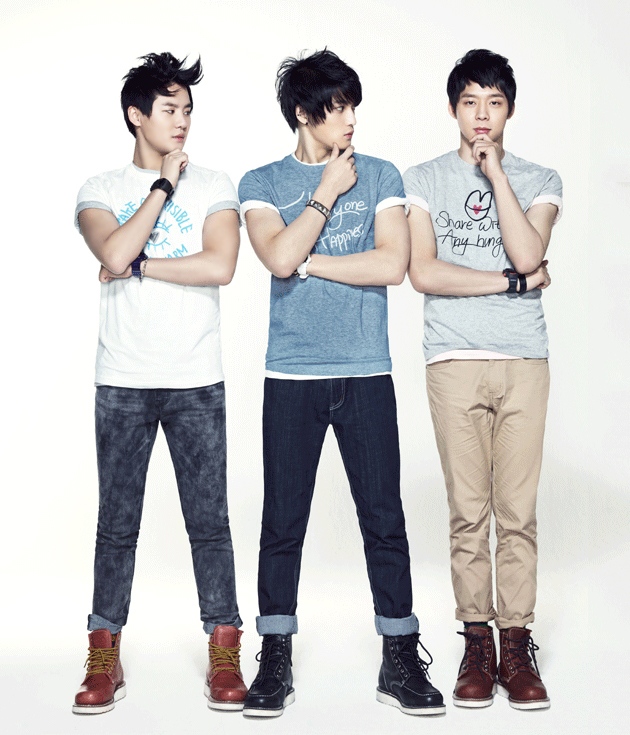[TRANS] 120104 JYJ, Fugitives Of K-Pop Who Refused To Be ‘Slaves’, What Will Their Fate Be…
Written by melodiamuse
T/N: PLEASE READ BEFORE READING THE EDITORIAL
There are parts in this editorial that some people may not agree with and may deem to be provocative. Please take these points into consideration while reading this editorial:
- Editorials are written from the personal perspective of the author. It does not directly represent the opinions and/or beliefs of the translator. HOWEVER, this not mean that we don’t agree with anything within the article, it just means we may not agree with everything.
- Great care has been taken to retain the original intention and voice of the author (I am being totally serious here. I started this article at around 5:30 and it is now 11. Calculating in my time for dinner and the breaks I’ve been taking, it’s till a solid 4 hours minimum) which includes word choice and retaining the original formatting.
- Nothing has been bolded except for the original subtitles as we have been told in the past that bolding may reflect upon our personal opinions.
- And as always, don’t shoot the messenger.
———————————————————————————————–
[Lee Dong Yeon’s K-pop Odyssey] K-pop’s Amazing Fandom
-Written by Professor Lee Dong Yeon Of the Korea National University of Arts
A K-pop craze is at its peak these days. In cities such as Tokyo, Beijing, Bangkok, even Paris, London and New York, K-pop is rising as a global pop genre. Broadcasting programs and internet media are raving that K-pop has become a global icon that showcases the cultural superiority of Korea to the world. But how much do we really know about K-pop? In what conditions did K-pop emerge into the limelight of global pop? How is K-pop music made, and how is it consumed? Is K-pop sustainable?
The K-pop we know isn’t real K-pop. This is because K-pop only deals with music from idols. It is also because the outside and inside of K-pop are cut off from each other. It is because international K-pop fans and domestic music fans see K-pop from different perspectives. K-pop is like Samsung, that has become a global corporation through its non-union myth. Though the idol groups have become global stars by working hard, the outlet for them to talk about their own troubles and pains has been blocked. Like Samsung, the global corporation without a union, K-pop is a global pop genre with no freedom and unlimited competition.
Though it’s true that there exists a global craze for K-pop, it’s been exaggerated by the media. Why is that? It’s because the media has a collusive relationship with entertainment production companies. More than 20 Korean press companies came together to cover the SM Town Live in LA concert in 2010. Of course, all expenses were paid for by SM. The day after the performance, a flood of articles praising K-pop came from the reporters who enjoyed the concert for free, and thanks to this, the stocks of Lee Soo Man, SM’s largest shareholder, shot up by 6 billion Won in the blink of an eye. Lee Soo Man’s stocks currently are valued at over 200 billion Won while Yang Hyeon Seok’s stocks from YG Entertainment, which went public last year, are valued at over 140 billion Won. The Korea Tourist Service, Inc. funded SM with 300 million Won for the 2011 SM Town Live in Paris concerts. K-pop has dominated the domestic market and has set its sights on the world with highly concentrated aid from the media and the government.
K-pop is a universal phenomenon, created by global fans who like music from idols in their teens to their 20s. It’s become a global sensation, not because it’s recognized for its musical talent, but more because it’s filling the gap left by idol pop of the past in the global music market. K-pop music creates unusual music by taking into consideration the trends of American pop and incorporating great dance moves, and an ironic situation has come about where third-party music markets are now imitating K-pop in return.
Professor Lee Dong Yeon of the Korea National University of Arts, who has played a big role in the creation of the Korea Pop Music Awards and has approached Korea’s pop music in a serious perspective through works such as ‘Idol’, has begun a series to explain K-pop. This series plans to delve into the secrets behind the ins and outs, the music and its industrial nature, and the creation and consumption of K-pop. This 10 part series will greet readers on a weekly basis and the first topic is JYJ, the perfect representation of the present state of K-pop.

▲JYJ made the problematic practices behind Korean idols’ contracts, which have even been compared to ‘slavery’, an issue in society once more.
JYJ are Exiled
JYJ are outcast of K-pop, fugitives. They are the Homo Sacer of K-pop, scared fugitives. According to Roman Law, Homo Sacer refers to a person who has been exiled, killed by someone, or erased from society and has his citizen rights taken away. But JYJ are neither political fugitives nor social rejects. We can’t make the conclusion that JYJ are as misfortunate as the lonely and worn out political refugees since they are still top stars in K-pop who have a large fandom. But they have the characteristics of exiled refugees and fugitives as they are unable to do what they wish in their own country.
JYJ are currently unable to appear on broadcasted programs like most celebrities. The only broadcasted program they’ve been in as a group was the airing of their congratulatory performance at the Daegu IAAF World Championships in September, 2011. Since leaving TVXQ two years ago, they have released official albums and sold many of them both domestically and internationally, but they have not received a single award at any domestic music awards ceremonies. Considering the fact that their first two albums ‘The Beginning’ and ‘In Heaven’ have each sold over 350,000 copies regardless of the deteriorating state of the album market, it’s almost impossible to understand why they have not even been named in nominee lists for Korea’s music awards ceremonies. Looking back on the fact that JYJ were named honorary ambassadors of the ‘Jeju 7 Wonders of the Natural World Nomination’ but had their performance cancelled for doubtful reasons, and the fact that their scheduled appearance on KBS ‘Music Bank’ never happened, we can come to the conclusion that there is either someone who is systematically hindering their activities or a large-scale interest group that has been working together to silence JYJ.
JYJ’s fans state that the people behind this hindrance is SM Entertainment, JYJ’s former agency. This is because they firmly believe that the only group of people capable of putting a stop to JYJ’s domestic broadcasted activities are SM Entertainment, who have been dissatisfied with the trio’s actions from the start. JYJ publicly exposed the unclear income division and unlawful nature of their contract with SM, and put the entertainment agency, that had been doing so well, in a bind. JYJ’s fans believe that SM is hindering JYJ’s activities as much as possible to exemplify what becomes of those who betray them, and to plant a sense of silent obedience in the minds of the idol groups currently in SM. It’s a plot that seems to have come straight from the life of a gangster. Even if a fatal blow was struck on TVXQ, the agency’s greatest idol group, and their activities, SM seems to have come to the conclusion that they can use their production power and authority to raise their current trainees, who are counting the days till they make their own debuts, to TVXQ’s high position. To SM, TVXQ are the filial sons who showed everyone the might of the company’s entertainment production power, but they are also the concubine’s child, who can be discarded at any moment.
SM’s Erroneous Judgment
There are two reasons why SM believed that they could incapacitate JYJ by putting a break on the group’s activities. One is that SM believes that, as the most powerful idol group production company of K-pop, they will be able to affect JYJ’s broadcasted activities. Due to the nature of Korean pop culture, it is impossible to be a hit in the industry without any broadcasted activities. The role that SM idol groups have in cable and major broadcasted channels is one of great power and presence. More members from these groups appear as regulars on music programs, variety shows and radio programs than members from any other idol group from any other entertainment agency. Even if direct pressure isn’t being applied by SM, broadcasting companies can’t help but tread on glass as SM is home to many of their programs’ regulars, and they can’t properly consider allowing JYJ to appear on their programs without SM’s tacit approval.The only reason why JYJ were able to appear on KBS during the closing ceremony of the ’2011 Daegu IAAF World Championships’ was because the program wasn’t under the entertainment sector. Though the broadcasting companies claim that they can’t allow JYJ to appear on their shows because of their lawsuit with SM, this argument has lost its persuasive power as the Courts have already laid down the verdict that SM’s exclusive contract with TVXQ was unlawful. Also, it has been reported that the Fair Trade Commission received a petition stating that SM was hindering JYJ’s activities, and is currently preparing to impose hundreds of millions of Won in fines as they have found proof of these hindrances through an investigation.
The second reason is that SM probably came to the conclusion that JYJ would not be able to secure a proper management system that levels up to the one they had as TVXQ. To be popular both domestically and internationally, idol groups require, not only talent, but a systematic management system that will take care of them. Idol groups require a large staff for music production, choreography, wardrobe choice and scheduling. SM seemed to have believed that in a sitaution where broadcasted activities were difficult to obtain, it would be close to impossible for JYJ to succeed without a powerful support system from an agency, even though they were former members of TVXQ.
But the strange thing is that JYJ are on a winning streak. Ironically, the two-member TVXQ, who are receiving full support from SM, are less active than JYJ. Even fans of the former TVXQ are fully behind JYJ’s activities and cause. When comparing the sell-out rate of concerts, popularity of showcases, album sales, activities as CF models and internet search rankings, it can be concluded that three-member JYJ are much more successful than the two-member TVXQ. Why is this happening?

▲Chairman Lee Soo Man of SM Entertainment is the representative icon of the Korean idol pop, or K-pop, success story. He is also the representative icon of idol stars’ slave contracts.
The Definition of the Fandom
The most important factor that SM has overlooked since TVXQ’s unlawful contract controversy began was the power of fandoms. It seems as though SM believed that there would to little to no unrest within the fandom if they kept the group going under the name ‘TVXQ’, even without the three members who left. They believed that as long as they kept the name of TVXQ alive, the fans would continue to cheer at and support the name. But their predictions were off. The majority of TVXQ’s fandom began supporting JYJ’s activities. What was important to the fans was not the name itself, but what defined TVXQ. With SM distorting the trio’s just cause into greed for an independent business, and with the other two members of TVXQ writing statements that threw the blame on the trio, TVXQ’s fandom moved towards JYJ’s side. JYJ were the definition and truth of what TVXQ had been. Fans believe that though JYJ no longer call themselves TVXQ, they continue to walk down the right path that TVXQ should follow as musicians, only under a new name.
Then what does JYJ’s fandom stand for? The fans strive to be the ones who protect their favorite musicians. It is in this point that fans can be deemed selfish. Fandoms act as exclusive as they can to protect their stars. That is why this fandom wants the separation of their favorite stars and the production company that made those stars who they are now. Though it’s true that stars are able to be active in the industry because of their production companies, the fandom believes that their stars won’t disappear just because they don’t have that production company anymore. To fandoms, production companies are a necessary evil and an inconvenient truth. Though their favorite stars need a powerful production company to succeed, they do not want to see their stars placed under strict control from these companies that have gained power and wealth from the fans’ economic investments. Furthermore, if their favorite stars’ contract is unlawful, if their schedule is suicidal and if they aren’t receiving a fair division of income, production companies can’t help but become a public enemy to the fans. The fandom’s distrust in SM, TVXQ’s production company, dates back many years. With HOT and Shinhwa’s past conflicts with SM over unlawful exclusive contracts in their minds, fans lived in fear that TVXQ could hit a snag at the height of their popularity over their own unlawful contracts.
When that fear became reality, TVXQ’s fandom chose to side with justice over the name itself. They created a base camp to support the three members of TVXQ and declared war on SM. With detailed logic and substantial proof, they explained why TVXQ’s contract was unlawful, why the members weren’t receiving a fair portion of their income and why SM wasn’t revealing the exact profits from TVXQ’s Japanese activities, successfully stirring up positive public sentiment. Also, they submitted petitions declaring that TVXQ’s contract was unlawful to the Fair Trade Commission and when JYJ’s broadcasted activities were blocked, submitted another petition that expressed the fans’ suspicions that SM was behind it. They were not afraid to go from being TVXQ’s fandom to JYJ’s fandom. Also, they collected donations to set up a support campaign for JYJ under the slogan, “We Support Your Youth”. In order to protest against JYJ’s inability to appear on broadcasted programs, they created satirical advertisements such as ‘You want to sing on TV? How dare you?’ and ’101 Ways to Get JYJ on TV’. While JYJ were living as fugitives, their compatriots were forming a new just republic.
The Source of Happiness, Free Will
Then, are JYJ, the fugitives of K-pop, happy? Of course they are. They are happy because of what their fandom stands for. JYJ’s source of happiness can appear to be commercial success on the outside. Since making their official debut in 2010, JYJ have been as successful as they were as TVXQ. They’ve sold at least 1.2 million albums in total with two albums, solo single albums, OST albums and concert albums. They appeared in over ten CFs, which include Lotte Duty Free, and not only have they released photobooks, an essay and DVDs, but all three members have also been appearing in movies, musicals and dramas. Including their live tour in Japan, their 2010 worldwide showcase and their 2011 world tour, they’ve held a total of 33 performances for 550,000 people. They’ve attained more economic wealth than they did as members of TVXQ, and have achieved more fame than the two-member TVXQ.
But the real reason as to why JYJ are happy lies in the fact that they are now in a free environment that puts them in control and allows them to choose their own activities. No longer do they merely wait to be told what to do by their agency, but they have now recovered their free will and are able to choose their own activities, and this is their true source of happiness. JYJ are currently not listed under any agency and are signed an agency contract with C-JeS Entertainment, giving the agency work that is required to keep the group going. Different from their days as TVXQ when they were given their schedules by SM, they have full control of what they will be doing. They now produce their own music and are expressing their wish to be called artistes. They now have the right to make the decisions on things such as holding concerts, performing as a unit and releasing albums, without having to tread on glass or get approval. Though they have become fugitives who have had to give up their nationality as members of TVXQ, they have been granted the right to make their own decisions. They’ve given up their original name and vested rights, but have in turn gained the free will to think and act as they please. Is this not the dream that many K-pop musicians should have?

▲TVXQ once released a song that had nuances of criticism against the members of JYJ.
Reuniting as TVXQ Once More?
TVXQ, who were once praised as the most perfect group in Korea’s idol group history, have now been divided into TVXQ and JYJ. This fateful split that occurred when they were at the top of their game can’t help but be a misfortune and tragedy for fans. Though it would have been best if all five members had left SM and pursued independent activities like Shinhwa, personal interests and misunderstandings got tangled up, leading to the split of the group.
Fans of the former TVXQ and even current fans of JYJ have all probably dreamt of the group’s reunion at least once. Of the two remaining members canceling their contracts, leaving SM and reuniting with the three members as TVXQ, that is. This is because there is little to no chance of JYJ returning to SM because they miss the name ‘TVXQ’. This leads to the question, will the two members of TVXQ be able to leave SM? And will they be able to exercise their power under the name TVXQ once more?
That is most probably impossible. As long as SM doesn’t give up their trademark rights to ‘TVXQ’, it will be impossible for any reunion to happen under the name ‘TVXQ’. There isn’t much of a possibility for U-Know Yunho and Choikang Changmin, the members of TVXQ who made the decision to stay in SM and have been active till now as a two-member group, to put into action the thoughts they must have had at one time of leaving SM. Even if it was possible, it would be impossible for them to use the name ‘TVXQ’. That leaves only two possible ways for the five members to get back together as TVXQ. The first is to accept the reality of a two-member TVXQ and a three-member JYJ, but to recognize JYJ as members of TVXQ in one’s heart. This means giving the three members of JYJ the actual authority and power behind the name ‘TVXQ’, though they are unable to use the name and though a two-member TVXQ exists under SM. In short, this means accepting the reality that the name and the contents of that name don’t match. In this case, JYJ will still have had to give up their original nationality as members of TVXQ, but will forever live as fugitives who are given a symbolic prestige and authority by fans.
The second way is highly unlikely, but draws the scenario in which the two remaining members of TVXQ leave SM and join JYJ. Even in this case, they will not be able to perform under the name ‘TVXQ’, but they will be able to regain their identity as members of TVXQ. This will be because all five members of TVXQ will have chosen exile together. The name doesn’t really matter. They could end up being JYJYC or YCJYJ. Though there were misunderstandings and hostility in the past, fans probably wish for the second scenario to happen. Even if it means being unable to call the five members TVXQ, and having to call them a new name of exile. As long as they are together, it doesn’t matter.
Source: [Pressian]
Translated & Shared by: dongbangdata.net
Momma’s Source: dongbangdata.net
Share This





